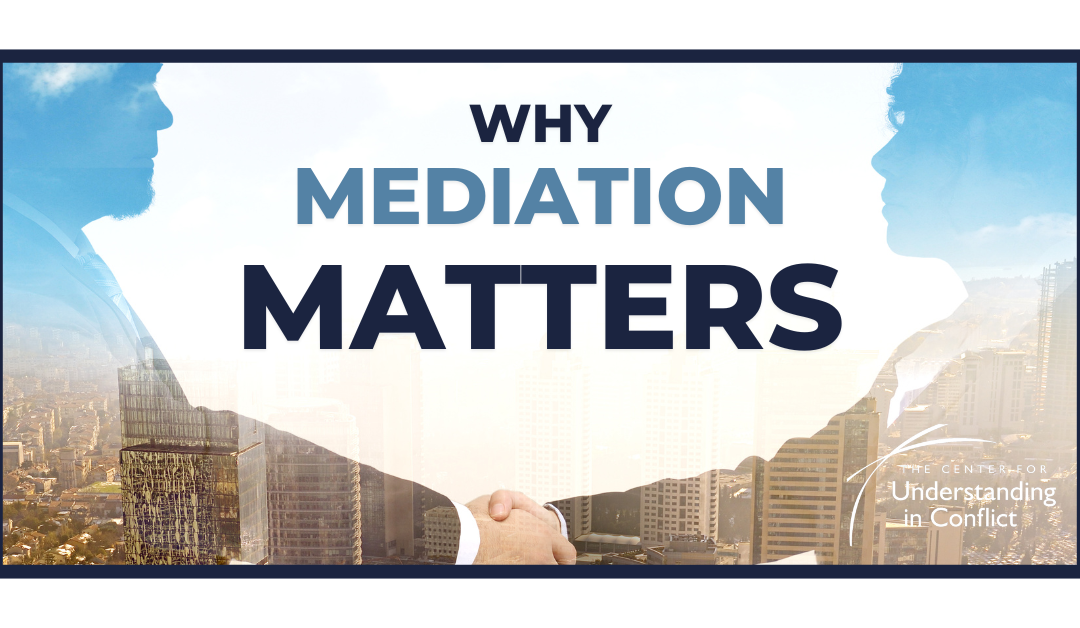Mediation is more than just a way to resolve disputes; it’s a journey toward understanding, healing, and growth. In a world often filled with misunderstandings, disagreements, and conflicts, mediation stands out as a beacon of hope—a process that empowers individuals to find common ground and move forward together. Imagine sitting down with someone you’ve been at odds with to reach a compromise and truly understand where they’re coming from. It’s about more than just finding a solution; it’s about building a bridge of empathy and connection. This approach transforms how we see conflict, becoming a powerful catalyst for change and growth.
Conflict resolution practitioners’ impact ripples out far beyond the individuals involved. People who mediate rather than fight, litigate, or walk away contribute to a more compassionate and cooperative society. In our increasingly polarized world, where differences often lead to division, practitioners can offer a refreshing alternative—a way to engage with one another that prioritizes dialogue over discord.
Consider how often conflicts arise in our daily lives—at work, in our communities, and even in our families. Now, imagine if more of these conflicts were handled through mediation. Instead of escalating into full-blown battles or lingering resentments, these disagreements could be transformed into opportunities for learning and growth. By choosing mediation, we make a statement that we value understanding over winning and connection over conflict.
Mediation also lightens the load on our overburdened legal system. Courts are often clogged with cases that could be resolved more quickly, affordably, and amicably through mediation. By diverting these cases to mediation, we speed up the resolution process and make justice more accessible to everyone. This is especially important for those who might not have the resources to engage in lengthy legal battles—mediation offers a more approachable and humane path to resolving disputes.
But mediation’s societal benefits don’t stop there. When people work together to resolve their conflicts, they strengthen the bonds that hold their communities together. This is particularly vital in marginalized or underserved communities, where access to traditional legal avenues may be limited. Mediation empowers these communities to take control of their disputes and find solutions that are fair, just, and sustainable.
For those who practice mediation, it’s more than just a job—it’s a calling, a way of being in the world. Practitioners are not just facilitators of dialogue; they are guides, helping people navigate the often choppy waters of conflict. And in doing so, they embark on their journey of growth and discovery.
The understanding-based approach to mediation strongly emphasizes the development of the mediator’s skills, mindset, and self-awareness. Mediators are trained to listen deeply, empathize with the parties, and create a space where all voices can be heard. This requires technical skill, emotional intelligence, and a genuine commitment to helping others.
Perhaps the most profound aspect of this approach is the way it encourages mediators to explore their own biases, assumptions, and emotions. In helping others navigate conflict, mediators are also challenged to look within themselves to understand their own triggers and reactions. This self-reflective practice is essential for effective mediation and contributes to the mediator’s personal growth and well-being.
Imagine a profession where your success is measured by the agreements you help forge, the connections you help create, and the personal insights you gain along the way. That’s the essence of mediation—an ever-evolving journey that enriches the mediator and the parties they assist. Mediation matters because it offers a path forward—resolving conflicts that honor our shared humanity and promote healing, understanding, and growth.
In a time when the world often feels divided and contentious, conflict resolution reminds us that there’s another way—a way that values empathy over antagonism, dialogue over division. It’s a process that resolves disputes, builds bridges, strengthens communities, and nurtures a more just and compassionate society.
